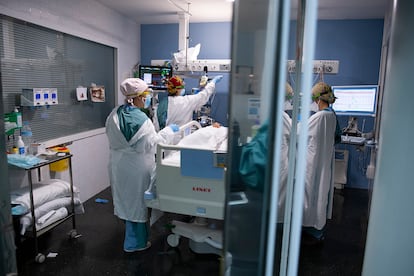Fifth coronavirus wave in Spain: ‘We would have been living through a massacre without the vaccines’
The Spanish Health Ministry reported 144 new Covid-19 fatalities on Wednesday, the highest figure since May

The fifth wave of the pandemic in Spain is once again showing the dangers of underestimating the seriousness of the coronavirus. Despite the strong progress of the vaccination campaign, the Health Ministry reported 144 new Covid-19 fatalities on Wednesday, the worst such figure since May. The grim statistic suggests there will be more bad news to come over the next few weeks, with deaths already exceeding 1,800 in Spain since this latest upsurge began to be registered.
People with compromised immune systems are, this time around, the group that is seeing the highest number of fatalities, according to all of the sources consulted by EL PAÍS. The over-70s continue to account for the most deaths during this wave, with 76% of the total – although this is a significantly lower number than the 84% registered during the three previous waves. The majority of those who have died were fully vaccinated – the rate is nearly 100% for the over-80s and 97% for the 70-79 group – but their delicate immune systems meant that they were still susceptible to the virus.
“While the deaths were falling among the rest of the groups, the immunosuppressed have continued to register very high mortality rates,” explains José Miguel Cisneros, the head of infectious diseases at the Hospital Virgen del Rocío in Seville. “This is the group that is being worst hit by the fifth wave.”
If we want to protect senior homes and the most at-risk population, we should administer third vaccine dosesJosé Luis Alfonso, head of preventive medicine at the Hospital General de Valencia
At this stage of the pandemic, however, few were expecting such high numbers of fatalities. And despite this setback, the heads of Spain’s major hospitals are thankful for the very high levels of vaccine coverage among the most vulnerable groups. “Without the vaccines, this would have been a tragedy,” Cisneros explains. “We would have been overwhelmed like we were in March 2020.” “We would have been living through a massacre without them, a catastrophe,” adds Federico García, head of microbiology at the San Cecilio Hospital in Granada.
Since June 23, when the infection curve began to head upward once more, a total of 946,000 coronavirus cases have been detected in Spain and there have been 1,847 Covid-19 deaths, according to the daily report supplied by the Health Ministry (the data in which is subject to certain notification delays). This is exactly 20% of the infections registered during the entire pandemic, but barely 2.2% of the deaths since March 2020 when the health crisis first took hold.
“The protection that the vaccines have offered to the majority of vulnerable collectives has been crucial,” explains García. “They’ve reduced infections, but also the serious cases that needed hospitalization and ultimately deaths.”
Not everyone, however, has been able to benefit from the vaccines in the same way. José Luis Alfonso, the head of preventive medicine at the Hospital General de Valencia, cites the immunosuppressed as the worst hit in this fifth wave. “The effectiveness of the vaccine in these patients is much lower,” he explains. “They have greatly reduced rates of antibodies compared to the rest of the population and nor do they develop cellular immunity.”
This group is primarily made up of people with cancer, transplant recipients and those affected by autoimmune diseases. While this type of illness can manifest itself at any time of life, prevalence increases with age. This means that the deaths registered among this collective are distributed in a similar way to the rest of the deaths associated with the coronavirus.
Since June 23, a total of 946,000 coronavirus cases have been detected in Spain and there have been 1,847 Covid-19 deaths
Experts point to two other groups that are being particularly hard hit in this fifth wave. The first is those who have only had one dose of the vaccine, in particular those aged 60 to 69. This group was assigned the Oxford-AstraZeneca medication, and initially had to wait as long as three months to receive the second dose. This time frame was eventually reduced to four weeks.
The second group is pregnant women. “The highly contagious nature of the delta variant and its circulation among the younger groups means that they are more affected,” explains Cisneros. “Most of them had not been vaccinated due to fears of side effects and because they had not been adequately informed. This is a group where there have been relatively few deaths quantitatively, but where they are always particularly painful.”
If the age of the nearly 51,000 Covid-19 fatalities between June 22, 2020, and the same date in 2021 is compared (i.e. including the second, third and fourth waves) and the 1,847 from this fifth wave, differences can be seen that the experts attribute to the effect of the vaccines, according to data from the Carlos III Health Institute in Madrid.
The over-70s, for example, continue to account for the majority of the fatalities, at 76%, but this is eight points lower than during the three previous waves. Cisneros attributes this fall to the lower circulation of the virus among seniors as well as the less serious symptoms that develop among the vaccinated.
The 60-69 group, meanwhile, have gone from representing 10% of fatalities during the second, third and fourth waves, to 13% in this fifth wave. This can be attributed to the fact that many only had a single dose of the vaccine when they got infected in recent weeks.
The immunosuppressed is the group that is being worst hit by the fifth waveJosé Miguel Cisneros, head of infectious diseases at the Hospital Virgen del Rocío
The relative weight of the 50 to 59 group has also grown in terms of fatalities, from 4% to 6%, while in the 40 to 49 group, the rise has been from 1% to 3%. A rise has also been seen in the rate for the under-40s, but the tiny number of fatalities in this group means that any meaningful comparison cannot be made.
“Mortality falls sharply with age, but the number of infections this time was so large among younger people that it is logical for there to be an increase if you take into account the protection that the vaccines offer to old people,” Cisneros explains.
The high mortality rate among the immunosuppressed is prompting many experts to call for a third vaccine dose among this collective, something that countries such as France have already started to do, or are planning to do, as is the case of Germany. While the scientific evidence is not yet conclusive as to the benefits of a third shot, current data and the safety of the vaccines so far are leading toward this option.
Alfonso believes that all the over-55s should receive a third dose of a Covid-19 vaccine – all the vaccines being used in Spain, apart from the single-shot Janssen, require two doses for full protection. “There is an inverse relationship between antibody levels and cellular immunity in relation to age, which is why several countries have already announced that they will administer the third dose or are studying doing so. If we want to protect senior homes and the most at-risk population, we should take this step. It’s not such a rare thing to do, and with other illnesses, more doses are administered. With Hepatitis B, for example, we administer as many as six,” this expert concludes.
English version by Simon Hunter.
Tu suscripción se está usando en otro dispositivo
¿Quieres añadir otro usuario a tu suscripción?
Si continúas leyendo en este dispositivo, no se podrá leer en el otro.
FlechaTu suscripción se está usando en otro dispositivo y solo puedes acceder a EL PAÍS desde un dispositivo a la vez.
Si quieres compartir tu cuenta, cambia tu suscripción a la modalidad Premium, así podrás añadir otro usuario. Cada uno accederá con su propia cuenta de email, lo que os permitirá personalizar vuestra experiencia en EL PAÍS.
¿Tienes una suscripción de empresa? Accede aquí para contratar más cuentas.
En el caso de no saber quién está usando tu cuenta, te recomendamos cambiar tu contraseña aquí.
Si decides continuar compartiendo tu cuenta, este mensaje se mostrará en tu dispositivo y en el de la otra persona que está usando tu cuenta de forma indefinida, afectando a tu experiencia de lectura. Puedes consultar aquí los términos y condiciones de la suscripción digital.









































